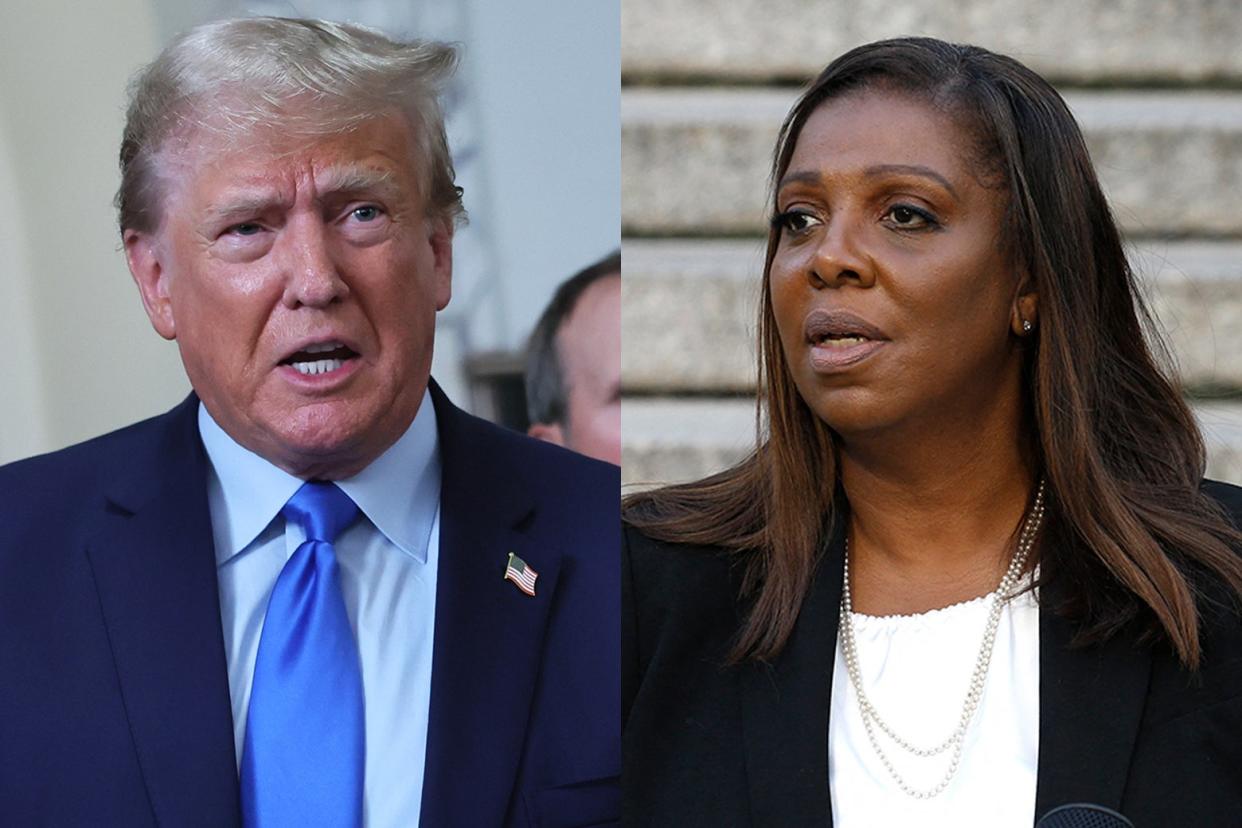Every Question You Have About Trump’s Fraud Trial, Answered, Including Why It’s Still Happening

- Oops!Something went wrong.Please try again later.
- Oops!Something went wrong.Please try again later.
- Oops!Something went wrong.Please try again later.
- Oops!Something went wrong.Please try again later.
Donald Trump is in court once again this week—this time for a civil trial in New York, over a lawsuit from Attorney General Letitia James alleging that the former president inflated the value of his properties.
By this point, you might be having trouble keeping all of Trump’s various legal battles straight, so here’s a quick guide to what’s going on with this week’s trial.
What is the New York attorney general’s lawsuit about?
It all started when Michael Cohen, a former personal lawyer of Trump’s, testified to Congress in 2019 that Trump had knowingly inflated the value of his assets in order to secure bank loans. That prompted the New York AG’s office to initiate a fraud investigation into the matter, and in 2022, James filed a civil lawsuit against Trump and his three eldest children to the New York State Supreme Court. (The case against Trump’s daughter Ivanka was dropped this summer due to the state’s statute of limitations.) It alleged that the Trump family and its companies had grossly exaggerated their net worth in order “to induce banks to lend money to the Trump Organization” and to get insurers to provide insurance coverage for higher limits and at lower premiums, plus gain tax benefits.
The lawsuit focuses on actions between 2011 and 2021, arguing that “more than 200 false and misleading valuations of assets” were made to defraud financial institutions. In that process, Trump also could have been violating New York state laws banning the submission of false financial statements, falsification of business records, and the commission of insurance fraud. The Trump family has denied any wrongdoing. The former president maintains that he never committed any fraud and that valuing real estate is a subjective process. On Monday, his attorneys argued that the banks who issued the Trump Organization loans profited and therefore could not have been defrauded.
Wait—didn’t a big ruling just come out about this case? What was that about?
New York Supreme Court Judge Arthur Engoron issued a ruling last week that found that Trump did in fact commit fraud by inflating the value of his assets when building out his massive real estate empire. One of many properties mentioned was Trump’s personal residence in Manhattan’s Trump Tower, which Trump falsely listed as being 30,000 square feet. In reality, the apartment is 10,996 square feet, which, Engoron noted, is “an overvaluation of between $114–207 million dollars.”
“A discrepancy of this order of magnitude, by a real estate developer sizing up his own living space of decades, can only be considered fraud,” wrote Engoron. In conclusion, the judge ordered that Trump be removed from control of some of his companies and revoked their business licenses—including Trump Tower and the Trump International Hotel.
So, if a ruling was issued, why is a trial still happening?
Well, James’ lawsuit includes seven causes of action, and last week’s ruling addresses only one. Engoron determined that Trump committed fraud. The trial playing out now will decide to what extent Trump used his financial statements fraudulently. James is alleging that this allowed Trump’s businesses to secure more favorable terms for bank loans, which also led to potential insurance fraud and earned him tax benefits under false pretenses.
This will be a bench trial, which means that Engoron will serve as judge and jury. It’s expected to take quite some time, continuing possibly until Christmas.
What are the consequences for Trump here?
Trump and his family could be banned for life from serving as an officer or director of any New York companies. Trump’s companies could also face a five-year ban from entering any real estate acquisitions. Then there’s the question of what financial penalties they should incur for the fraud that’s been committed—James is seeking $250 million.
Because this is a civil case, nobody faces potential jail time. However, James’ office did send a criminal referral to federal prosecutors and the Internal Revenue Service after uncovering what the office believes to be federal crimes, including bank fraud and lying to financial institutions.
Has Trump done anything interesting in court?
True to form, Trump has repeated his line about the trial being a political witch hunt. Upon arriving at a New York City courthouse on Monday, Trump said the civil suit he’s facing is “a scam, it’s a sham.” He attacked Engoron as a “rogue judge” and called James “a horror show.”
Throughout Monday’s proceedings, the former president sat silently between his attorneys, mostly with his arms folded and scowling. He may have ordered some comfort food from his favorite fast food chain to get him through the day—about six bags of McDonald’s delivery were spotted outside the courthouse.
We may be hearing from Trump in court at some point—his attorney indicated that Trump will testify during the trial.

